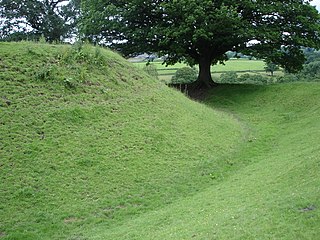Related Research Articles
Gwyddno Garanhir was the supposed ruler of a sunken land off the coast of Wales, known as Cantre'r Gwaelod. He was the father of Elffin ap Gwyddno, the foster-father of the famous Welsh poet Taliesin in the legendary account given in the late medieval Chwedl Taliesin.
Maelgwn Gwynedd was king of Gwynedd during the early 6th century. Surviving records suggest he held a pre-eminent position among the Brythonic kings in Wales and their allies in the "Old North" along the Scottish coast. Maelgwn was a generous supporter of Christianity, funding the foundation of churches throughout Wales and even far beyond the bounds of his own kingdom. Nonetheless, his principal legacy today is the scathing account of his behavior recorded in De Excidio et Conquestu Britanniae by Gildas, who considered Maelgwn a usurper and reprobate. The son of Cadwallon Lawhir and great-grandson of Cunedda, Maelgwn was buried on Ynys Seiriol, off the eastern tip of Anglesey, having died of the "yellow plague"; quite probably the arrival of Justinian's Plague in Britain.
Hu Gadarn is a supposed Welsh legendary figure who appears in several of a series of Welsh Triads produced by the Welsh antiquarian and literary forger Iolo Morganwg. These triads, which Iolo put forth as medieval works, present Hu as a culture hero of the ancient Britons who introduced ploughing. However, it is now known that the triads, like all of the so-called "Third Series" of triads, were fabricated by Iolo himself. The name "Hu Gadarn" earlier appeared in a Welsh translation of a French romance about Charlemagne. Still, Iolo's version of Hu Gadarn was taken up in the 20th century by the poet Robert Graves, who associated him with other Celtic figures; since then he has been popular among neopagans.
A bardic name is a pseudonym used in Wales, Cornwall, or Brittany by poets and other artists, especially those involved in the eisteddfod movement.

A gorsedd is a community or meeting of modern-day bards. The word is of Welsh origin, meaning "throne". It is spelled gorsedh in Cornish and goursez in Breton.

Edward Williams, better known by his bardic name Iolo Morganwg, was a Welsh antiquarian, poet and collector. He was seen as an expert collector of Medieval Welsh literature, but it emerged after his death that he had forged several manuscripts, notably some of the Third Series of Welsh Triads. Even so, he had a lasting impact on Welsh culture, notably in founding the secret society known as the Gorsedd, through which Iolo Morganwg successfully coopted the 18th-century Eisteddfod revival. The philosophy he spread in his forgeries has had an enormous impact upon neo-Druidism. His bardic name is Welsh for "Iolo of Glamorgan".
Springwatch, Autumnwatch and Winterwatch, sometimes known collectively as The Watches, are annual BBC television series which chart the fortunes of British wildlife during the changing of the seasons in the United Kingdom. The programmes are broadcast live from locations around the country in a primetime evening slot on BBC Two. They require a crew of 100 and over 50 cameras, making them the BBC's largest British outside broadcast events. Many of the cameras are hidden and operated remotely to record natural behaviour, for example, of birds in their nests and badgers outside their sett.
This article is about the particular significance of the year 1962 to Wales and its people.

Iolo Tudur Williams is a Welsh ornithologist, nature observer, television presenter and author, best known for his BBC and S4C nature programmes, working in both English and his first language of Welsh. After a 14-year career with the RSPB, in 1999 Williams became a full-time TV presenter. He has written a number of books about the natural world.
Côr Tewdws or Bangor Tewdws is a fictional Romano-British ecclesiastical college that in the 18th and 19th centuries was understood to have been the predecessor of the historically attested 6th century College and Abbey of Saint Illtud at what is now Llantwit Major in Glamorgan in Wales. The supposed Roman college is believed to have been invented by the historian of ill-repute, Edward Williams, more generally known as Iolo Morganwg.
The Myvyrian Archaiology of Wales is a printed collection of medieval Welsh literature, published in three volumes by the Gwyneddigion Society between 1801 and 1807. Until John Gwenogvryn Evans produced diplomatic editions of the important medieval Welsh manuscripts, the Myvyrian Archaiology provided the source text for many translators of medieval Welsh material. It was founded, and funded, by Owen Jones, who engaged William Owen Pughe as editor, and Edward Williams, better known as Iolo Morganwg, to search Wales for manuscripts.
The Welsh Ornithological Society is an organisation which promotes the study and conservation of birds in Wales. Each year it organises a conference and publishes two issues of the journal Welsh Birds, one of which contains the Welsh Bird Report. It was founded on 26 March 1988 at a conference in Aberystwyth. It now has about 250 members. The television presenter and author Iolo Williams has been the society's president since November 2009.

Saint Eigen, Eurgen, Eurgain or Eurgan was the legendary, and possibly historical first female Christian saint among the Britons. Her name has doubtfully been linked to two Welsh churches and is found in manuscripts from the collection of Iolo Morganwg making historical evidence of her existence dubious and limited.
Taliesin Williams was a Welsh poet and author, and son of the notable Iolo Morganwg.

Barddas is a book of material compiled and written by the Welsh writer Iolo Morganwg. Dressed as an authentic compilation of ancient Welsh bardic and druidic theology and lore, its contents are largely Iolo's invention. It was posthumously published by John Williams for the Welsh Manuscripts Society in two volumes, in 1862 and 1874.

The Coelbren y Beirdd is a script created in the late eighteenth century by the literary forger Edward Williams, best known as Iolo Morganwg.
Norah Isaac was a Welsh author, drama producer and campaigner for Welsh-language education. She became head of the country's first Welsh-medium school, Ysgol Gymraeg yr Urdd, in 1939.

Alice Gray Jones was a Welsh writer and editor, known by the pseudonym "Ceridwen Peris". She was an active temperance campaigner, and a co-founder of the North Wales Women's Temperance Union.
Lowri Gwilym was a Welsh television and radio producer. She worked for BBC Wales and the Welsh-language channel S4C.

"Owain Glyndŵr's Court", also known as "Sycharth" or "The Court of Owain Glyndŵr at Sycharth", is a cywydd by the Welsh bard Iolo Goch. It describes and celebrates the hall and household of his patron, the nobleman Owain Glyndŵr, at Sycharth in Powys. It cannot be dated exactly, but was probably written about 1390, before Glyndŵr's revolt against the English crown. It survives in as many as 24 manuscripts.
References
- ↑ "Iolo Williams Television" . Retrieved 28 September 2016.